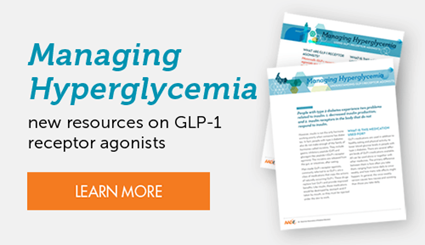Minority Health Month and a Call To Action
Apr 24, 2019, 10:36 AM
by Timika Chambers, MSN, RN, BSN, CDE
I began practicing as a registered nurse in 1999. After a few months of being on the medical-surgical floor, I realized that I needed to be on the education side of health care, particularly in diabetes education. Many people were spending an excess of energy, money, and time on preventable conditions. I felt that diabetes education addressed the whole person. I have often said that diabetes management is life management. I served people with diabetes (PWDs) from a variety of cultures and races, many who struggled with managing their diagnoses and suffered from diabetes-related complications. I can still visualize the sadness on their faces, the darkness that surrounded them, and hear words like “I wish I had known my diabetes was this bad,” or “I thought I had just a little sugar.”
African Americans, American Indians, Native Americans and Hispanics, have an increased risk of being diagnosed with diabetes, suffering from diabetes-related complications and dying from diabetes

During their hospitalization, many of the PWDs found out for the first time that they needed one or two amputations or to start dialysis. What I saw was beyond their diabetes-related complications. I saw the anger, disappointment and lack of hope not only in themselves, but also in the medical profession. Disparities in healthcare was a known issue then — some of the PWDs knew that they were not receiving quality care. I knew that there was a better way. When the opportunity to serve as a diabetes educator came, I gladly accepted. I believe that every person has the right to receive quality healthcare. When we have the information to share and resources to give, why should we hold back? Why should we hold back from anyone?
After reentering the diabetes profession in 2016, I found it hard to believe we still had not conquered health disparities. The United States continues to spend billions of dollars on diabetes management, and many people, especially African Americans, American Indians, Native Americans and Hispanics, have an increased risk of being diagnosed with diabetes, suffering from diabetes-related complications and dying from diabetes. Unfortunately, certain ethnic groups and races are not receiving the individualized quality care that we all have a right to receive.
At a recent clinic visit, for myself, I experienced firsthand the concerns and complaints that I have heard from people throughout the years, including those with diabetes. I am a nurse, yet, when I asked about signs and symptoms to look for related to heart complications, the healthcare provider confirmed one symptom. No other symptoms discussed. I received no educational handouts or pamphlets. As I stood there for a moment and looked at the healthcare provider, I realized the link between the lack of education and the hopelessness that one feels.
A change in healthcare starts with one compassionate and determined person at a time. The call for action is not to give specialized care; the call for action is to give the right care at the right time to the right person. This person-centered care is a core pillar of AADE’s vision for the future of diabetes education and plays a strong role in the future of health care.
April is National Minority Health Month, which marks an opportune time to reflect on health disparities among the PWDs you serve and to address them. Here are six things diabetes educators can do to help close the gap in health disparities.
- Give mindful education and support. We teach mindful eating to PWDs. We must put the same principle in our practice.
- Build trust in action and words by being consistent and honest with your clients. PWDs, regardless of culture and race, must know that they are more than a number.
- Praise PWDs for coming to their appointments. You never know what they had to overcome (anger, fear, resentment, etc.) to get there.
- Put together a comprehensive checklist of questions, labs, and resources to use at the appointment. Do a quality check on yourself.Sometimes we forget. A checklist will help you remember.
- Put together a community and national resource specifically for different cultures and races.
- Follow-up on the resources that you give to your clients. Knowing that you care can be the push that many people need to take care of themselves.
 About the Author
About the Author
Guest blogger Timika Chambers is a Certified Integrative Nutrition Health Coach, Certified Diabetes Educator, and has over 20 years of experience in the nursing profession. She has served in community and hospital settings, as well as academia. Timika helps her clients design a lifestyle that is full of energy and focus, by helping them to achieve balance in critical areas of their lives. She offers one-on-one counseling, group coaching, and presentations and training on diabetes management to lay persons and healthcare professionals. Visit her Instagram, Facebook, or Twitter to learn more.